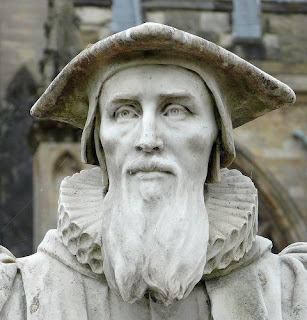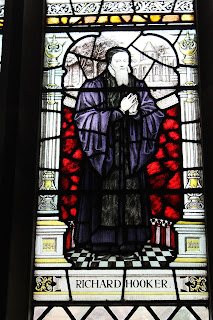There should be a Hookerian Movement
There is no Hookerian Movement - Diarmaid MacCulloch, All Things Made New: Writings on the English Reformation (2017), p.319.
MacCulloch's statement comes to mind on this commemoration of Richard Hooker because I have just finished reading Paul Anthony Dominiak's Richard Hooker: The Architecture of Participation (2021). This superb work is a very effective rebuttal of MacCulloch's portrayal of Hooker. The conclusion of the latter's essay 'The Reputation of Richard Hooker' suggests that Hooker had immense energy ("protean") but little direction:
no one since his death in 1600 has been able permanently to pin him down or to say exactly what constitutes the message of his huge, his enormous - his great book.
Dominiak convincingly demonstrates otherwise and - contrary to some 'Old Hat' Anglican accounts of Hooker, which find an echo in MacCulloch - emphasises the systematic nature of Hooker's thought:
Hooker intends the arguments of the Laws to be systematic, endeavouring that 'that every former part might give strength unto all that followe, and every later bring some light unto all before'. Such an account is systematic insofar as each move acts like a jigsaw piece: thought a complete picture of Christian doctrine may be absent, each individual piece gestures towards linkage and a unifying picture. Participation illumines the entirety of the Laws: it is the principle behind and implied in every argument; all of Hooker's claims must be read in light of his commitment to participation. The architecture of participation forms a picture of associated ideas that, at various points, individually emerge to structure and justify both Hooker's particular claims as well as his overall argument. No one piece fully explains or contains the entirety of his Christian vision, but each witnesses and contributes to the presence and force and of it. Across the Laws, the architecture of participation stands behind and informs every major claim, generating relations between ideas that mutually gesture back and forth towards each other. The architecture of participation both structures his particular arguments, but also describes the rhetorical tone and purpose of the Laws. Just as divine influence manuducts creation towards it beatitude through natural and supernatural means, Hooker's Laws attempts to induce his opponents not only to obey the ecclesiastical polity of the Church of England, but also to freely embrace it as the mediating aspects of God's call to heal and restore creation in Christ. As such, the Laws certainly both contains and displays a system (the architecture of participation), allowing us to classify Hooker as a systematic theologian. In Hooker's systematics, of course, the person of Jesus Christ represents the key who unlocks the separation but also the link between nature and grace in the architecture of participation. Across the Laws, Hooker develops a Christ-centred theological vision that he uses to explore the matters at hand in an integrated way, sufficiently confident about what it illumines (namely the architecture of participation) that he employs and advocates it. Indeed, Hooker's very method in the Laws is, as Andrea Russell puts it, 'intensely participative' since it imitates (as a text seeking to 'resolve the conscience') the manuduction by God of a broken world such that it enjoys the peace and order that is the 'participation of God himselfe' (p.194).
This understanding Hooker as a systematic theologian of the participatory vision has echoes in other recent insightful interpretations. Andrew Davison's Participation in God: A Study in Christian Doctrine (2019) lists Hooker among prominent post-Reformation figures maintaining the patristic and Thomas vision of participation. For Rowan Williams (2004), Hooker's role as "one of the inventors of that distinctive Anglican mood which I have elsewhere called 'contemplative pragmatism'" is profoundly rooted in his account and application of "patristic Christological teaching" on the Incarnation and "Christ's assumption of a complete humanity", "the ground for a renewing of the entire human race". John Hughes noted the significance of "the language of participation and deification in Hooker", resulting in this "defining Anglican theologian of the post-Reformation period" establishing a theological foundation for a "characteristically Anglican" vision: "a sense of all creation being in God and God being in all creation, through Christ". A Hookerian Movement, in other words, offers the potential for a meaningful and deeply Christocentric theological renewal in contemporary Anglicanism, in place of what Hughes termed "the customary Erastian and latitudinarian lines about pragmatism, compromise, empty inclusion and not having to believe very much".
Dominiak also indicates how such a Hookerian Movement could renew the ecumenical vision of contemporary Anglicanism. This would entail a fresh encounter with the Orthodox East:
Anglican-Orthodox can and should ... comfortably move to a rich and productive level of common agreement about deification as a shared theological emphasis for the Christian life.
Likewise, Hooker's place within the broader Reformed tradition (confirmed, as Dominiak notes, by Kirby), "opens up a range of possibilities for dialogue between the Anglican and Reformed churches". Pointing to work of contemporary Reformed theologian Boersma on participation and his emphasis on this being a common, shared understanding between theologies in the Churches of the Reformation and those in the Roman Catholic tradition, Dominiak states that Hooker's account of participation therefore assists in "breaking down an overly simplistic dualism between 'Reformed' and 'medieval' or 'Catholic' thought in relation to modernity". That Hooker could aid in deepening Anglicanism's experience of communion across the divides of the Great Schism and the Reformation era is itself, of course, an expression of the participatory vision, of "the mysterie of our coherence with Jesus Christ" (LEP V.56.7).
Christocentric theological renewal within Anglicanism, deeply patristic, thoroughly catholic and reformed. A renewed and deepened ecumenical vision, flowing from and returning to the Church's participation in Christ. Such could be the fruits of a Hookerian Movement within contemporary Anglicanism. It may indeed by the case, as MacCulloch states, that "there is no Hookerian Movement" - but there should be.




Comments
Post a Comment